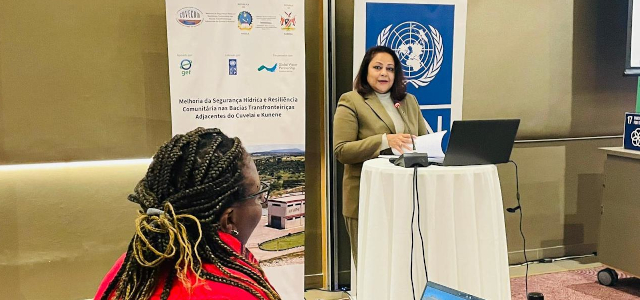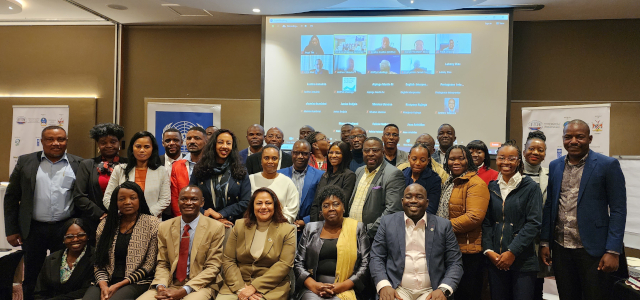The USD 11.2 million project represents a significant advancement in enhancing water security and community resilience across these regions. Scheduled to run from May 2024 until November 2029, the project is funded by the Global Environment Facility (GEF) and led by the United Nations Development Programme (UNDP) as the GEF Implementing Agency. The Global Water Partnership Southern Africa (GWPSA) is the Executing Agency, while the Cuvelai Commission (CUVECOM) and Kunene Permanent Joint Technical Committee (PJTC) are the focal custodians of the project implementation.
The Ministry of Energy and Water of Angola and the Ministry of Agriculture, Water, and Land Reform of Namibia, along with UNDP Namibia supported by UNDP Angola officially endorsed the project through the signing of the project document in May 2024. Following the project endorsement, an inception workshop was held in Windhoek, Namibia, from 9 to 11 July 2024 to facilitate and guide project understanding based on the project’s goals and objectives and to ensure project ownership by stakeholders.

“The project will enhance resilience and livelihoods,” said Alka Bhatia, UNDP Namibia Resident Representative.
“We will implement twelve gender-responsive, community-driven demonstration projects both in Namibia and Angola, to enhance resilience and livelihoods. These projects include water harvesting with community-based aquaculture and livelihood-based watershed management pilots. This project is likely to have far-reaching positive impacts on other SDGs, such as education, health, and gender equality,” said Alka Bhatia, UNDP Namibia Resident Representative.
The Cuvelai and Kunene River basins are essential to the well-being and livelihoods of communities in both Angola and Namibia. However, these regions face significant challenges such as extreme variability in water availability, frequent floods, and droughts. Climate change further exacerbates these issues, threatening water security and socio-economic development.
“This project brings the much-needed effective governance to safeguard the future of our shared water resources and contributes to uplifting peoples' livelihoods. Through collaboration, innovation, and dedication, we can create a more water-secure and resilient future for the communities reliant on the Cuvelai and Kunene River Basins,” said Mr. Leonard Hango, Senior Hydrologist at Namibia’s Ministry of Agriculture, Water, and Land Reform.
By promoting sustainable management of water resources through a collaborative, integrated approach, this project aims to address these challenges. Leveraging the strengths of both nations, it is set to significantly improve water governance, enhance resilience, and ensure sustainable development.
“This project launch is a significant step towards enhancing Transboundary Water Resource Management. It aims to tighten water governance in both basins and bolster Angola's institutional capacity for managing central water towers. This initiative is crucial for building effective solutions in the region,” explained Ms. Luzia da Conceição, Head of Licensing, Inspection, and Environment at Angola’s Department of Gabinete Para a Administração da Bacia Hidroeléctrica do Cunene (GABHIC), in the Ministry of Energy and Water.
The signing of the project document and holding of the inception workshop underscores the commitment of Angola, Namibia, and their partners to collaborate towards the common goal of water security and community resilience. This project embodies the spirit of cooperation and innovation, uniting stakeholders from various sectors to create lasting change.
As the project progresses, anticipated outcomes include improved catchment management practices, upgraded water treatment and distribution facilities, and stimulated economic development and diversification. Additionally, the project will offer research opportunities, equipping the region to better address climate change challenges.
